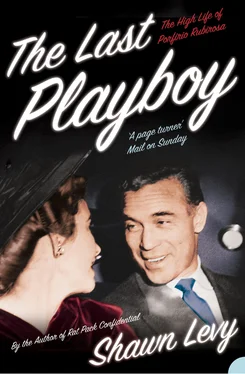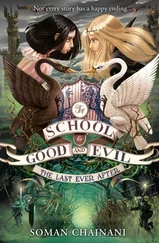As García gathered himself and wandered off, dazed and ashamed, Porfirio accepted his friends’ acclaim with sarcastic pomp. (“I preened,” he recalled.) But a minute or so later, García was back, this time wielding a knife and demanding satisfaction. Porfirio agreed to a duel, and the two set off down El Conde in search of a blade of equal size and weight. Failing that, García suggested they find a pair of matching pistols; again, the younger man agreed. As they walked along, García made small talk, and asked Porfirio who he was.
“I am the son of General Rubirosa.”
The bully stopped walking. “In that case,” he declared, “I cannot fight you. I served under your father.”
The episode became a local legend, spun in some versions with elaborate detail. But there was a bitter private irony to it: Don Pedro’s name might still have been big enough to ward off an angry man with a knife, but his body was failing. In 1930, just before the national elections, he moved to San Francisco de Macorís, ostensibly to run as a congressional deputy for the district but quite obviously to die in the tranquility of his birthplace.
He moved into the house of his father-in-law, a strange old bird who’d been an important local lawyer until he was accused, in 1895, of having embezzled public funds; he was proven innocent, but he was so offended that his fellow townspeople should doubt him that he became a hermit, isolating himself in his house. “He never left his study or library and he refused to see anyone besides his family and clients,” remembered Porfirio. “He never again put a foot in the street, and the only journey he made out of the house was in the hearse that carried him to the cemetery.” Don Pedro wasn’t quite so eccentric, but he was just as surely retreating from the world.
The gravity of his father’s condition impressed Porfirio, who left Santo Domingo for Don Pedro’s side and applied himself sufficiently to his studies to pass his baccalaureate and find work teaching French in a local school. He kept up his soccer, he took up competitive swimming, he traded lessons on the ukulele for guitar lessons from his cousin Evita.
And he sat patiently as Don Pedro, his voice weakened, told stories of his warrior days and shared his worries over the seemingly permanent chaos of Dominican governance. Indeed, even as Santo Domingo prepared for what was being billed as a free election, a rebellion against the government was brewing in—where else?—the Cibao.
Don Pedro knew the minds of both the government and the rebels. He had been offered positions of responsibility by both, refusing in each case because he saw the country’s salvation in neither. In particular, he had strong fears about the leader of the National Police, a cunning and unlikely arriviste who had diabolically made Don Pedro the offer of ruling the country after a coup. As he sat with his son reading a newspaper account of the brewing rebellion, Don Pedro pointed a feeble finger at a name in a headline and said, as his son recalled, “Here is the heart of the plot. The one in charge, in the shadows, pulling the strings, who has all the trump cards, is Trujillo.”
*In England and America, they came to be known as lounge lizards.
THREE
THE BENEFACTOR AND THE CHILD BRIDE
His uniforms were always immaculate, as were, when he could finally afford them, his hundreds of suits.
His manner careered unpredictably from obsequious to civil to icy.
His appetites for drink, dance, pomp, and sex were colossal.
His capacity for focused work seemed infinite.
He was a finicky eater.
With his thin little mustache, he looked a cross of Charlie Chaplin’s Monsieur Verdoux and a bullfrog, always with his hair slicked back, always standing erect to the fullness of his five feet seven inches, always tending slightly toward plumpness (as a boy, he was mocked as Chapito: “little fatty”).
He had a massive ego that sat perilously on a foundation of dubious self-confidence.
He remembered everything and forgave nothing, though he might wait years to avenge a grudge.
He wasn’t above physically torturing his enemies and throwing their corpses to the sharks, but he had at his disposal more insidious schemes that involved anonymous gossip, public shunning, and other shames that cut deeper, perhaps, than any punishment his goons might mete out.
His scheming and brutality and cunning and shamelessness and greed and nepotism and cruelty and gall and paranoia and righteousness and delusions of grandeur verged on the superhuman.
He was one of the most ruthless and reprehensible caudillos , or strongmen, ever to hold sway in the Western Hemisphere—and one of the most enduring.
He was Rafael Leonidas Trujillo Molina, and he formed an unholy bond with Porfirio Rubirosa that would crucially shape the latter’s life.
Trujillo was born in October 1891, the third of eleven children of a poor family from San Cristóbal, a provincial capital in the dusty south of the island. The town began as a gold rush camp, then settled into a long, hard haul as one of the island’s many centers for processing sugarcane. It was never an illustrious spot, but for several decades of the twentieth century, it was known by federal decree as the Meritorious City, simply because it was the birthplace of this one man.
By his sixteenth birthday, with only a grammar school education, Trujillo was working full-time as a telegraph operator—and perhaps doing a little cattle rustling on the side, though records of his activities in that sphere would one day disappear. (Likewise, he was convicted of forgery and at another time suspected of embezzlement, but in neither case could it be shown on paper after he’d established his domain over the nation and its historical records.)
By his twenty-second birthday Trujillo was married to a country girl named Aminta Ledesma who was pregnant with a baby daughter who would die at age one and, like her father’s criminal record, be erased from later accounts of his life. A second daughter, with a grander future, came the following year. They named her Flor de Oro—“golden flower” in English, “Anacaona” (the name of a warrior chieftainess of the Jaragua tribe) in the native Taino.
Trujillo first engaged with the hair-raising brand of Dominican politics in the mid-1910s, when he joined an unsuccessful rebellion against one of the nation’s fleeting governments and had to live on the run in the jungle until finally, ragged and starving and underfed and missing a few teeth, he threw himself on the mercy of the authorities. Granted amnesty, he came back home and turned to crime, as a member of a gang called the Forty-four. And then he found honest work in a sugar refinery, first as a clerk and then, providentially, as a security guard.
It was no rent-a-cop position. In the lawless Dominican Republic of the era, the policía of a thriving private business constituted, in many cases, the only local authority of any standing. These forces were charged with keeping the peace and guarding their bosses’ property from theft, but they also fought fires in the cane fields, protected payrolls, made sure workers didn’t defect to rival operations, and mounted and supervised such profitable side businesses as bars, brothels, and weekly cockfights.
It was a position that called for a calculating mind composed of equal parts soldier, accountant, psychologist, and mafioso. Trujillo was perfect for it.
He liked the work so well, in fact, that he decided to become a career soldier, applying at the end of 1918 to join the National Police, the only military force open to a Dominican during the American occupation. His letter requesting induction was a combination of bootlicking, braggadocio, and bald-faced lies: “I wish to state that I do not possess the vices of drinking or smoking, and that I have not been convicted in any court or been involved in minor misdemeanors.”
Читать дальше












